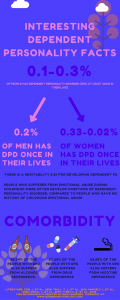Dependent personality disorder causes
There are a few dependent personality disorder causes and risk factors that significantly increase the chance of developing dependent personality disorder (DPD or Dependent PD). Some of these dependent personality disorder causes are related to the way people have been raised, whereas others are related to the DNA our parents gave us. One of the Dependent PD causes is childhood abuse or neglect [1],[5], but also possessing executive functioning deficits [3] or having parents with DPD [2] increases the chance of developing dependent PD.
At the moment, researchers are still busy identifying new dependent personality disorder causes, therefore this page will be updated every now and then.
Jump to:
- What is dependent personality disorder?
- How is dependent PD diagnosed and what are the symptoms?
- What are DPD treatment options?
- The dependent PD test.
- How to cope with DPD?
- Living with someone who has DPD.
- Online counseling for Dependent PD.
- Take me to the homepage.
At Barends Psychology Practice we offer (online) therapy for dependent personality disorder. Contact us to schedule a first, free of charge, online session. (Depending on your health insurance, treatment may be reimbursed).
Dependent personality disorder causes – Biological factors
Research [2] has shown an inheritability of 0.81 for developing dependent personality disorder in children. According to this study [2] there is a strong genetic component that is present and measurable in childhood that explains individual differences in personality disorders. The heritability coefficient found in this study is comparable to coefficients found in other studies for adult personality disorder traits and for normal personality traits [2].
On top of that, people with dependent PD have a higher chance of inheriting executive function deficits which explains why they have difficulty with everyday decisions, judgment, and making choices [3]. Both studies suggest that the DNA parents give their children can be one of the dependent personality disorder causes. However, having a higher chance of developing dependent PD because your parents gave you certain genes, doesn’t mean you Will develop DPD. It is possible that someone with certain genes and a healthy childhood will not develop a DPD, because that way someone learns to deal with difficult everyday situations.
(Advertisement. For more information, please scroll down.)
Dependent personality disorder causes – Environment
Childhood traumatic experiences can affect someone’s behaviour significantly as they grow older. Traumatic experiences, if left untreated, can cause people to have nightmares, flashbacks, and they can develop behavioural problems. For more information on how childhood traumatic experiences can affect someone’s behaviour as they grow older, please click here: PTSD & complex PTSD.
Research shows that people who suffered from emotional abuse during childhood have a higher chance of developing dependent personality disorder, compared to people without a history of emotional abuse [1],[5]. Also, people who suffered childhood sexual or physical abuse have an increased chance of developing DPD [4].
In other words, research shows that childhood traumatic experiences can have a huge impact on the development of personality problems or personality disorders. Childhood traumatic experiences can trigger the development of DPD, because such experiences can cause these people to blame and/or hate themselves. It’s possible that these people feel like they can’t trust themselves, because of what happened in their childhood. These childhood experiences will most likely change their behaviour, because they don’t want these things to happen again. A small change in behaviour and perhaps even in personality can have huge effects on people when they are adults.
If this is the case, then it’s likely that these people have an increased chance of developing dependent PD when they are older.
(Advertisement. For more information, please scroll down.)
Dependent personality disorder causes – risk factors
- In the UK men are more at risk of developing DPD, than women, but in the USA women more often have DPD, compared to men. This contradiction could be explained by the heritability coefficient, but also by the representativeness of the research sample and the questionnaire used for the diagnosis [7].
- People with a substance, tobacco or alcohol dependency more often develop dependent personality disorder [7].
Literature used for this page:

